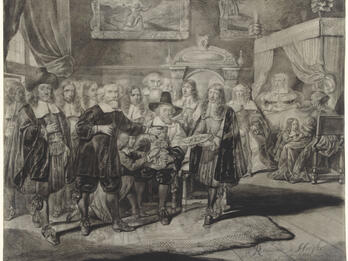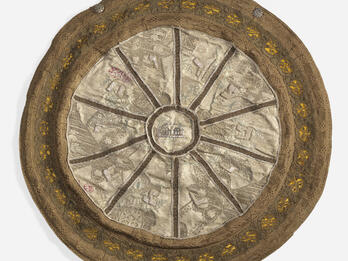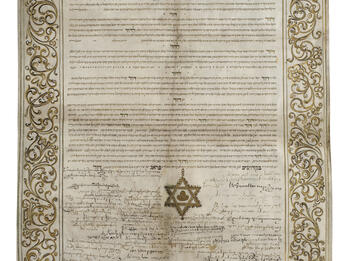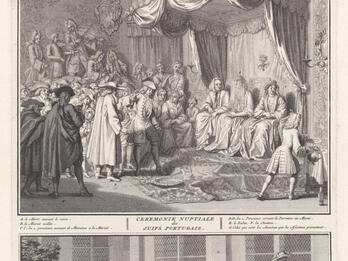Vave ha-‘amudim (Hooks of the Columns)
Now comes the turn, with awe and reverence, awe and reverence without end, of my father, the pious, God-fearing, learned one, may his strength be for the Torah [see Esther 2:15], the supernal light, may his name and the praise of his virtue and piety be remembered for good, as his fear of sin took precedence to his wisdom [m. Avot 3:9]; and the Lord is with him (1 Samuel 16:18), that is, in every area the halakhah is ruled in accordance with his opinion [see b. Sanhedrin 93b]. In his talmudic studies, he would descend and pierce the very depths; in his sharpness of mind, he was like a bear robbed of her cubs (2 Samuel 17:8) and like a roaring lion. And he established many yeshivot for renown and glory. His lips dripped honey [see Song of Songs 4:11]; they spoke great things. Before a thousand [see Daniel 5:1] he girded himself with the weapons of the mighty and overcame his combatants, uprooting mountains.
With the strength of his youth, he earned many titles, as he was appointed Head of the Court and an adjudicator for large communities and regions. And he bowed his shoulder to bear (Genesis 49:15) the yoke, the burdens of this people [see Numbers 11:11] like a shepherd leading his sheep to tranquil waters, in both matters of Heaven and worldly matters so that they would not fall into the depths of the pit.
However, he did not manage to write a thorough, valuable, and lengthy account in book form of all the novel ideas that he produced every day on the Talmud and the halakhic authorities. He was only able to jot them down as short notes, just enough to remind himself of them so that he should not forget. Now I have found in his possessions a great and awe-inspiring work that he composed on the book of the Mordechai [ben Hillel (1250–1298)], from beginning to end, in which he expresses his disagreements with all the halakhic authorities. See how humble he was, as he did not seek to get it published. May God be gracious to me and enable me to publish the honor of his majesty, to show the people his excellence [see Esther 1:4, 11], and his sharpness and expertise.
Not only was he a faithful shepherd to Israel in his Torah and his service of God, but his virtues and piety only increased over time, as he provided strength to Torah scholars, to make the Torah great and glorious [see Isaiah 42:21]. Throughout his life, there were never less than eighty mouths at his table, and yet he fed them fatted and healthy fowl on weekdays, Sabbaths, and festivals, when they would gather in his house and at his table.
And now I turn to the one close to his seam (Exodus 28:27), his glorious splendor, his dove, his perfect one [see Song of Songs 5:2], she who is worthy to be remembered for the good, my mother, my teacher, the chamber of her who conceived me (Song of Songs 3:4), the lady, the rabbi’s wife, the pious woman. All those who knew her would attest and declare about her that she lacked absolutely nothing from the deeds of the holy matriarchs, as she would eat even non-sacred food in a state of purity. She worked to support my master, my father, of blessed memory, as he spent all the money she brought in from her father’s house to provide for Torah scholars. Not only did she not begrudge this, but on the contrary, she added even more of her own. Please look and see if you will find a woman among them all as good as this one [see Ecclesiastes 7:28], as she rejected the life of this world and all her actions were for the world to come.
On her account, God blessed my master, my father, of blessed memory, and he merited all the honor and greatness that he received outside the land of Israel, which no man had earned on earth, from the creation of heaven and earth. Then, in his great righteousness and piety, he left behind his home and hearth, and he immigrated to the place where God said that He would rest His presence. Before he left his tent and the land of his birthplace, he began to write this splendid and breathtaking book, as a testament to his family, but in his humility he did not impose upon his sons to publish it. However, he sanctified us through his commands and instructed us to fulfill the wishes of anyone who asks for a copy of this book, which can teach him his pious ways. Since the Master of the path altered his way for him [see Numbers 22:32] and hastened him, to bring his intention to fruition, to shine the light of his Torah in the land of life, the book was therefore not completed outside of Israel, but in Jerusalem, two years after his arrival. It was God’s plan that he should merit to see the rich treasuries, the gracious words of the mouth [see Ecclesiastes 10:12] from the tradition of that embodiment of a godly, wise man, the great rabbi, our master, R. Isaac Luria, may the memory of the righteous be for a blessing, may his soul rest in peace. Now these writings were not seen by anyone until my father, my master, of blessed memory, came to his treasury and his house. For my father established his residence there, and he studied them from beginning to end in order to achieve his aim.
Credits
Published in: The Posen Library of Jewish Culture and Civilization, vol. 5.







